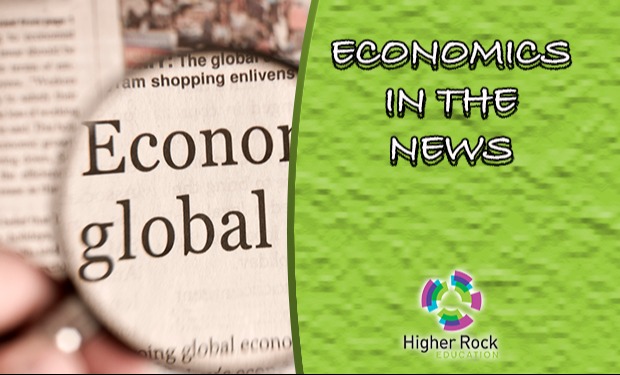
Economics impacts our lives every day. Below are some of the top storylines from this past week related to economics.
o Federal Reserve chair Jerome Powell faces a unique threat of economic uncertainty and political hostility, as he looks to navigate a trade war that threatens to push prices higher while weakening the United States economy. Powell and the Fed have sought for the past two years to slow inflation. Now, falling immigration and cuts to federal contracts risk impacting the labor supply and demand.
During his seven-year tenure as Fed chair, Powell has faced his fair share of turbulent times. He dealt with President Donald Trump’s first trade war in Trump’s first term in office, the COVID-19 pandemic, historic inflation and multiple high-profile bank failures. Powell and the Fed board is filled with contracting judgements and professional aspirations. [The Wall Street Journal]
o A power outage at London’s Heathrow Airport left air carriers scrambling to reroute flights and left thousands of travelers stranded. Heathrow handles an estimated 1,300 flights per day from more than 80 different airlines, making it one of the busiest airports in the world.
With the aviation system deeply interconnected, disruptions can have a large ripple effect on the industry. When last week’s outage occurred, 120 flights full of people already on their way to London. Those flights were diverted and pilots had to find other places to land. Passengers also had to find hotel rooms and alternative flights wherever they ended up, changing their original itineraries. [The New York Times]
o Restaurants are noticing a trend that diners are less interested in taking home leftovers. Restauranteurs are attributing the trend of leaving leftovers at the restaurant on social stigmas, the ease of ordering takeout, and a return to sharing food after the pandemic. Another clear indicator whether a diner might carry out food is whether they drive to the restaurant. Many diners in large cities rely on public transit and leftovers don’t fit in their lifestyle.
The average American leaves 53 pounds, or $329 worth, of food per year on their plate when dining at restaurants, according to ReFED – an organization that is committed to reduce food waste. [The New York Times]
o Community colleges have long served as a bridge to the American dream for poor and working-class students, allowing students to complete their general education courses during their first two years of college at a much lower cost than traditional universities. Associate degree graduates can then transfer to a university where they can take more advanced courses in pursuit of their bachelor’s degree. However, enrollment in community colleges has plunged – down 17 percent from 2010’s peak. A little more than 5.8 million students were enrolled in community colleges across the country in the fall of 2024. And 1.3 million of those students are dual-credit programs, earning college credits while still in high school.
In Texas, the Alamo Colleges District near San Antonio implemented a guided pathways program in 2014, that has since been implemented across all institutions in Texas. Alamo overhauled its entire structure, including changing the counseling and advising system, reorganizing its majors and academic programs to broadly align with its local job market, then met with colleges to align credits to transfer from Alamo Colleges District to popular universities across Texas. [Bloomberg]
o DoorDash has partnered with payment service company Klarna to offer a “buy now, pay later” option for customers. The service offers shoppers a layer of convenience, allowing them to spread the cost into interest-free payments. Customers ordering on DoorDash are offered four different payment options, including paying immediately, breaking up the payment into four installments, or deferring payments to a more convenient time that allows installments that align with customers paycheck schedules. For Klarna, the company has 657,000 merchant partners across 96 countries, as it has sights set to an initial public offering (IPO) on the New York Stock Exchange in April.
Buy now, pay later programs have increased in popularity in recent years, with more shoppers than ever opting for the service during the 2024 holiday season, according to The Washington Post. However, experts warn of risks associated with buy now, pay later plans, including the psychological impact of instant gratification which can lead to unnecessary purchases that customers are unable to afford. [The Washington Post]